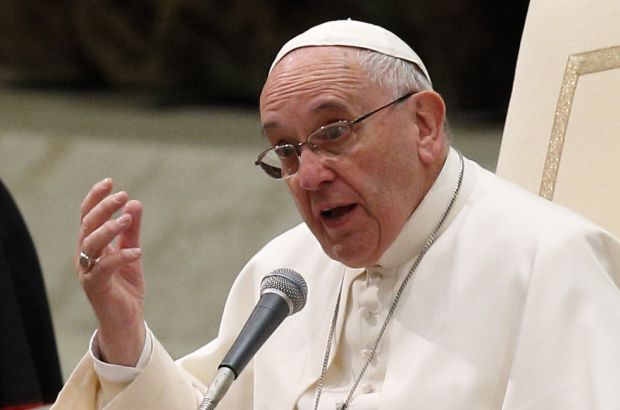VATICAN CITY (CNS) — Drop the innocent look and the habit of judging others, Pope Francis said; recognizing one’s own faults and failings is the first requirement of being a good Christian.
In fact, paradoxically, one finds peace and relief in judging one’s own sins, being merciful toward others and saying, “Who am I to judge?” he said March 2 during his homily at a morning Mass celebrated in the chapel of the Domus Sanctae Marthae, where he lives.
The pope’s homily was based on the day’s reading from the Book of Daniel, which laments, “We have sinned, been wicked and done evil,” and expresses the shame of having rebelled against God who is so full of compassion and mercy. It also focused on the Gospel reading according to St. Luke, in which Jesus tells his disciples to stop judging and condemning, but to “be merciful, just as your Father is merciful.”
[hotblock]
Pope Francis said it is so easy to shift the blame.
“We are all experts, we have Ph.D.s in justifying ourselves: ‘But it wasn’t me, no, it’s not my fault. Well, OK, but it wasn’t that bad, you know. That’s not how it went.’ We all have an alibi to explain away our failings, our sins,” he said.
“So often we are able to make that face that says, ‘Who, me?’ that face that says, ‘Well, I didn’t do it, maybe it was someone else,’ playing innocent,” he said. “But one doesn’t progress in Christian life this way.”
While it is easier to blame others, “when we begin to look at the things we are capable of,” the evil that one is tempted to commit, he said at first “we feel bad, we feel disgust,” but then “something a bit strange happens,” the self-critical approach then “gives us peace and well-being.”
By directly, honestly and quietly confronting the evil within, such as feeling envy and knowing how it can lead to putting people down and “killing them morally,” he said, one discovers “the wisdom of accusing oneself.”
“If we do not learn this first step in life, we will never, ever make progress on the path of Christian life, spiritual life,” he said, according to Vatican Radio.
Another Christian virtue is being able to feel ashamed before God, he said. Christians should engage in a kind of dialogue with the Lord, not being afraid to feel that shame expressed in the Book of Daniel.
When people can see their own faults, he said, it is easier to ask God for mercy and to be merciful toward others.
“When someone learns to accuse oneself, one is merciful toward others: ‘Yes, but who am I to judge if I am capable of doing worse things?'”
The phrase, “Who am I to judge,” he said, comes from listening to Jesus telling his disciples to “Stop judging and you will not be judged. Stop condemning and you will not be condemned. Forgive and you will be forgiven.”
The day before, after praying the Angelus with visitors gathered in St. Peter’s Square, Pope Francis urged people to listen to Jesus and follow him because only he brings true happiness.
“Jesus’ path always brings us happiness, don’t forget it,” he said March 1.
While following Jesus will always mean carrying some kind of cross and enduring some hardship, the pope said, “in the end he always brings us happiness. Jesus does not deceive, he promised happiness and he will give it if we follow his ways.”
By following Jesus, one’s life can become “a gift of love toward others, in docile obedience to God’s will, with an approach of detachment from worldly things and of inner freedom,” he said.
PREVIOUS: Forgiveness of sins: An audio reflection for Lent
NEXT: Sing to the Lord, despite the rising waters of fear




Share this story